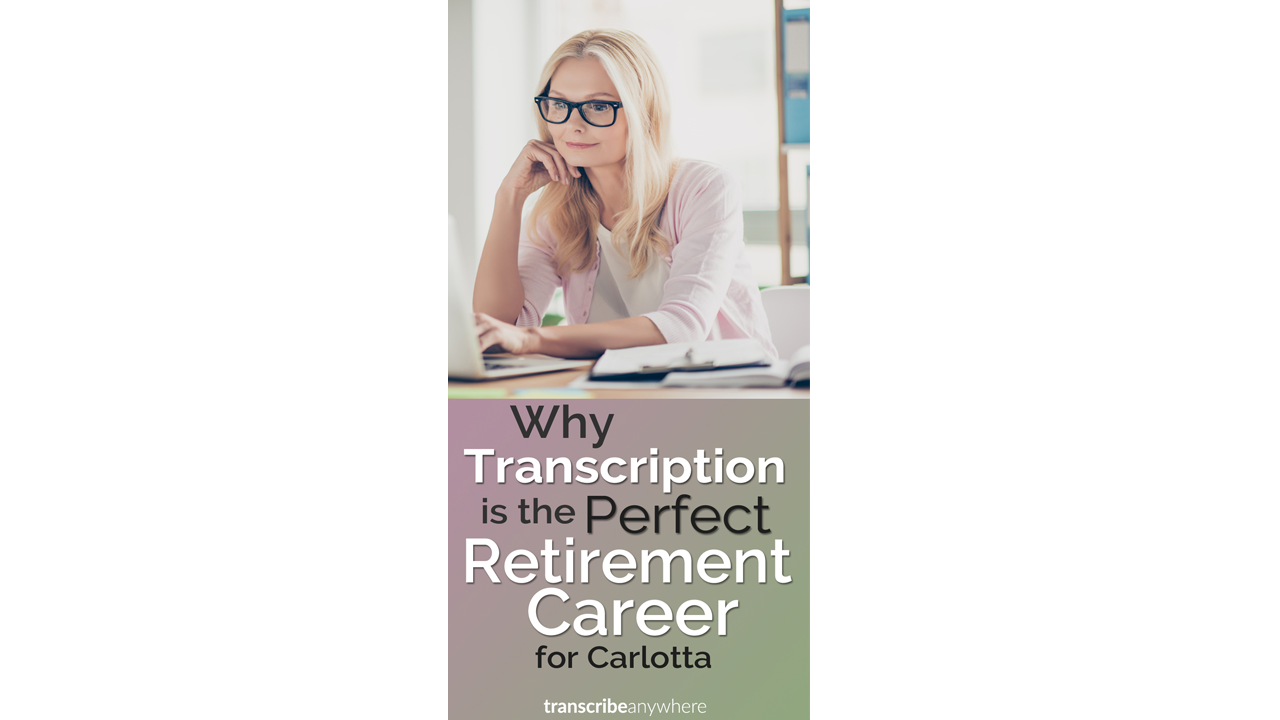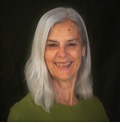Why Transcription is the Perfect Retirement Career for Carlotta
Oct 19, 2024
You're going to LOVE today's success story!
Carlotta has a fascinating journey to her retirement career as a freelance transcriptionist. She's living her dream life all because she found Transcribe Anywhere. Hearing stories like hers always gives me goose bumps... because there's nothing I love hearing more than when my students succeed.
Take it away, Carlotta :-)
Q: Hi, Carlotta! Can you tell us a little bit about your background? What did your life look like before Transcribe Anywhere?
 I’ve been an administrative assistant and a “secretary” since the early 1970s, so my fingers have danced the keyboard for decades.
I’ve been an administrative assistant and a “secretary” since the early 1970s, so my fingers have danced the keyboard for decades.
In fact, I actually taught myself to type when I was a kid on my father’s old manual typewriter that he somehow acquired during his service in the Navy in WWII. The first thing I typed was actually a transcription: I typed in the text of a children’s library book that I liked.
As a 21st century admin sitting in a gray cube under artificial light, coming and going from home in the dark, bound by dress codes and policies and office politics that often made me more than a little uncomfortable, I knew there was a better life out there somewhere. The trouble was that I had no idea how to get from here to there.
However unfulfilled I may have found myself in these often-lowly office jobs, they had provided me with a great skill set for freelance transcription. I learned customer service, clear communication skills, multitasking with shifting priorities, staying organized, filtering out conversations that might be happening near me, and so forth.
Q: I love that you technically began your transcription journey at such a young age! When did you start doing transcription, and what made you decide to learn it?
I stumbled onto my first transcription assignment while temping between jobs. I absolutely loved the voice in my ear pouring out through my fingertips. The intimacy of it, like I could get inside the speaker’s head. I believe it was an attorney’s audiotape file, so a fleeting preview of where I find myself today.
Years after my first exposure to audio-to-text transcription, while doing genealogy research on my family, I stumbled onto another transcription job: deciphering old handwriting and typing it into searchable print files. I loved this work, too! For four years I did this as a side gig while continuing to work at my day job. I loved the deep focus required and I always love researching, so I would annotate the documents I created to provide historical context.
But it seems most historical societies are simply putting PDF scans of the original writing online and letting descendants and researchers figure it out themselves. There wasn’t much more work like that to be found, once this handwriting-to-text job was completed.
The Perfect Retirement Career...
It was after my admin career ended with my retirement in 2015 that I began wondering about freelancing from home. We had had a terrible winter that year and the public transportation system broke down almost on a daily basis. Those issues accelerated my decision to resign from my corporate job. Despite my modest lifestyle, however, social security wasn’t covering the bases, so I needed to set up a retirement career.
I had spoken with a professional transcriptionist years before that, envying that she could do the work from home. She had told me there was no way I would get decent work without certification. After looking online at courses and not finding anything, I had put the idea aside. But when I stumbled onto Janet’s course early last year, I got so excited because I saw Transcribe Anywhere for the gateway that it is.
Q: And I, for one, am thrilled you found TA :-) What was the most challenging part in getting started?
Definitely the technical piece. Downloading the audio files, figuring out Express Scribe, FastFox shortcuts, and Video Download Helper. Once I got these installed and figured them out, I really loved how simple they made the task.
Q: You're absolutely right -- the technical piece can be challenging, but it makes the work so much easier. What has been the most valuable thing you learned during the course?
That you can listen and play back, but the second or third time you play from the top you will hear things you missed the first time. That’s why I think the answer keys in Janet’s course are so crucial. Don’t cheat yourself of these. Three-quarters of the time you will spend on your professional transcripts will be checking your work. You will get proofreading practice comparing your transcript with Janet’s key. You will also find phrases in the key that you missed or misinterpreted in your own transcript, and then hone your ears by re-listening to the audio.
Q: How long did it take you to find your first client? How many clients do you have now?
I got my legal certification late last year but haven’t looked for legal work yet. I’ve been involved with selling my house, apartment hunting, and moving since the beginning of the year.
I have one (non-legal) client right now, an agency located three time zones away, which is interesting. They send me qualitative data research, which basically means information-gathering interviews. The pay is less than what Janet recommends we charge as independent freelancers, but it’s an entry point. I regard it as an internship that will give me more speed and confidence when I’m ready to start using the legal certification and find clients on my own.
I should add that I made no effort to find the agency I’m currently working for; they found me because of the graduate directory that Janet has posted online. This is a big deal. Getting a certificate with no idea how to plug it in makes the certificate near-worthless. But Janet has given us a lot of tips and information to help us get the business off the ground, including this directory. I just got another email today from an agency that I would want to work for in the future!
Q: What advice would you give anyone thinking about becoming a transcriptionist? Is it worth the money for training?
OMG, yes! But you have to LIKE transcribing and not expect an easy ride. I was so cocky when I started because I majored in English, my mother was an English teacher, I’ve published a lot of book reviews, and I read and write a lot. I’m a fan of Shakespeare, as nerdy as it gets! But I was over my head for a lot of the course. It was like stepping into a little cave with a flashlight and finding my way down, down, continuing to find cavern after cavern, deep underground!
Q: I hear that a lot from my students! Transcription isn't easy, but it's the best job ever (in my opinion). What do you think it takes to be a GOOD transcriptionist? How about a GREAT one?
A good transcriptionist is detail-oriented to the point where they get a little jolt anytime they see spelling or grammar errors. He or she needs to understand transcription is about one-quarter of the work; once you have the draft, it’s much more about proofing your transcript with an eagle eye. You also need excellent research skills to verify the spelling of unfamiliar words. You need to understand what you are hearing so you can put things in context.
A GREAT transcriptionist knows it’s more than typing and proofing. In the end, it’s ALL about customer service. Listening skills. Knowing what questions to ask to establish a clear agreement. Going that extra mile to give excellent service. Putting customer satisfaction first.
Q: What’s your favorite thing about being a transcriptionist? What about your least favorite?
I LOVE LOVE LOVE not having to commute to a job, or work on someone else’s terms, or enact someone else’s policies, wear/not wear what someone else tells me. I love being able to set my hours according to my own biorhythms and plans for the day. And I love being able to take a nap in the middle of the day and know that my work will be fresher and sharper for it.
I especially love that I have the option to take my work with me if I want to travel. I don’t lose income while I’m away. It's a blessing that I like the work so much that it’s not going to spoil any vacation.
What’s hard about transcribing for me is that there’s a lot of back strain if I work too long without taking breaks. My mind engages and could go on forever, but I have to hear my body saying, “Hello, hello? Anybody home?” and honor it. Hence, my pattern of uninterrupted work chunks with frequent breaks. Also, I think my eyes need the daylight as much as my upper body needs to stretch out, so I try to think of errands or other breaks I can take outside.
Q: Breaks are SUPER important with this work. Always take care of yourself first! What does a typical day look like for you? Anything else you’d like to share?
Rise at 5:00 sharp. Make tea, meditate, do whatever yoga poses I’m currently working on, make my bed, and write in my journal. By then, it’s 6:00 or 6:30 and I take a look at my schedule and jump into my work. I work in 45-minute sprints with laser focus (no peeking at phone), then step away from the laptop and relax completely.
My relaxation breaks get longer as the day continues. They can be anything from trying a new recipe to walking to the library or seeing a movie at the cinema five minutes away. I try not to be stuck at the laptop during designated break times! In the early evening I might continue with my transcription work or go out, visit with friends, see a play.
So I work a lot and relax a lot, even though I switch back and forth between chunks of recreation and chunks of work throughout the day.
If I’m at home in the evening, I’m usually off the laptop altogether two hours before bedtime so I can get a solid night’s sleep. I spend my last two waking hours stretching, reading, writing, planning, and doing quiet activities.
It’s a good life.
Our Take
A good life, indeed. I love Carlotta's passion for her work and determination to live a balanced, healthy life. I think we can all learn a thing or two from her!
Your Turn
Does transcription sound like a great retirement career for you? See if it's a good fit with my free 7-lesson course!
